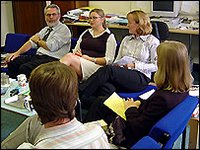End of the year and my kids are doing some homework – in this case the BBC KS3 (11-14) bitesize science tests in biology, chemistry and physics. Three sets of short tests and they’re howling with laughter. “This is just a load of crappola, dad” says Callum, then called me over every time he hit a howler, and that was pretty often.
JUST PLAIN WRONG
Let’s start with the stuff that’s simply WRONG.
Q The products of photosynthesis are:
carbon dioxide and water (right according to Beeb!)
glucose and oxygen
light and dark
Initially Callum thought he had learnt this the wrong way round, but no, the Beeb clearly have no idea what the ‘products’ of photosynthesis are – right answer is ‘glucose and oxygen’.
OK, to err is human, we all make mistakes, but it doesn’t get much better in chemistry.
Q A liquid has a pH of 1 – what does this mean?
it must be sodium hydroxide solution
it is strongly acidic
it is weakly acidic (right according to Beeb!)
Wrong again, the right answer is that ‘it is strongly acidic’.
Q Which state is shown in this diagram?
Diagram shows particles all touching each other in a beaker.
solid
liquid (right according to Beeb!)
gas
Completely wrong, ‘solid’ should be the right answer. The particles are tightly packed and all touching each other.
Q Which ammeter will have the biggest reading
Series circuit showing: ammeter – bulb - bulb – ammeter.
ammeter 1
ammeter 2 (right according to Beeb!)
they will read the same
To quote the Beeb’s own words in the revision section, “It doesn't matter whether you connect the ammeter on the left or right of the lamp, it will still give the same reading".
Q The diagram shows the waveform of two notes played on a musical instrument.
Which sound is louder, A or B?
Two waves (A & B) are shown. A has a higher amplitude but same frequency as B.
A
B (right according to Beeb!)
WRONG – it is A.
TWO RIGHT ANSWERS
Then there’s the questions with two possible right answers.
Q What natural process breaks large rocks into smaller ones?
erosion
sedimentation
metamorphosis
crystallisation
weathering (right according to Beeb!)
Erosion involves movement, and often results in the breaking down of large rocks into smaller ones, e.g. in river beds, cliff erosion etc.
Q Which of the following is NOT an effect of burning fossil fuels?
global warming
ozone depletion
acid rain
smog
fog (right according to Beeb!)
Ozone depletion is also correct as the result of CFCs which are completely artificial (they did not exist in nature prior to synthesis by humans). They were used in air conditioning/cooling units, as aersol spray propellants prior to the 1980s, and in the cleaning processes of delicate electronic equipment. They are not the result of burning fossil fuels.
Q What needs to be done to this circuit so that the lamp lights up?
Series circuit shown open switch and a bulb.
close the switch
add another lamp
add a cell (right according to Beeb!)
Again the first answer is also correct, and as it appears first, many choose it before reading on.
SPELLING, CAPITALISATION and MISSING WORDS
Q Which part of the skelton protects the lungs? Skelton?
Q What is the main reason why need protein in our diet? Missing word.
Q influenza, flu, is caused by? No capital at start of sentence.
Q Which of the following is not a use of artificial satellites?? Double punctuation.
Q Click the diagram that shows correctly how light beams and is reflected by a convex mirror. Sentence doesn’t make sense.
STUPID OPTIONS
This one is annoying as it makes the already awful tests invalid by giving the learner stupid and obviously wrong options.
Q Which of the following is not a fossil fuel?
velociraptor (STUPID OPTION)
coal
oi
l
Q What is magma?
a chocolate ice cream (STUPID OPTION)
molten rock
bubbles of gas
Q What can happen to a plant growing in soil without minerals?
it grows really well
it grows poorly if at all
it leaves to find somewhere else to grow (STUPID OPTION)
Q What are the tiny air sacs in the lungs called?
ravioli (STUPID OPTION)
bronchioles
alveoli
Then there’s one that is so stupid you can’t get it wrong.
Q What does the hazard symbol mean?
Sign with word ‘CORROSIVE’ on it!
corrosive (IMPOSSIBLE TO GET WRONG)
irritant
harmful
TOO ADVANCED OR JUST CONFUSING
To give KS3 kids questions that are too advanced or plain confusing is another all-too-common fault. Then there’s the downright confusing.
Q Which of the following is not a way that we can reduce the use of fossil fuels?
leaving the TV on standby all night
walking instead of going in a car,
turning the lights off when we leave a room
This becomes an exercise in logic for the learner with its double negative in the question and, in option 3, a triple negative!
Q What does the heat energy supplied to an ice cube do when the ice is melting?
it warms it up
it makes the ice particles expand
it breaks some of the bonds in the ice *
The first option is arguably correct, it does warm it up, and as it is the first option, many go for it.
Q Which contains more heat energy,
100 grams of water at 0 degrees C
or
100 grams of ice at the same temperature?
Strange question – absolutely designed to confuse at this level. They claim the water but a curious learner may question whether water can be water at 0 degrees C.
Can it get any worse? Yes it does. This question is actually impossible to answer:
Q What is the value of the clockwise moment on the wooden bar in N/cm, if each coin
As half the question is missing, it is impossible! I kid you not.
I could go on, as there’s lots of other errors, but I’ve already shown that the content is full of wrong answers, confusing (at times impossible) questions and poor English.
The writers show a lack of basic science, as well as a lack of assessment design skills. Should these people be allowed near our children? You can go through the BBC learning content and find this slapdash approach in almost everything they do. Forget the idea that BBC=QUALITY. As a licence payer it makes me mildly annoyed, as an educator it makes me furious.
 Wikipedia, actually Wikia (not-for-profit venture), announced in Paris that it is to offer “free software, free bandwidth, free storage, free computing power, free content over the internet.” It will run using MediaWiki and ALL ad revenue will go back to the bloggers and others who use the service.
Wikipedia, actually Wikia (not-for-profit venture), announced in Paris that it is to offer “free software, free bandwidth, free storage, free computing power, free content over the internet.” It will run using MediaWiki and ALL ad revenue will go back to the bloggers and others who use the service.



























